Covid-19 and Pregnancy
Medically reviewed by Drugs.com. Last updated on Jun 5, 2024.
AMBULATORY CARE:
What you need to know about coronavirus disease 2019 (COVID-19) and pregnancy:
Pregnancy increases your risk for severe COVID-19 illness. COVID-19 can also lead to preterm delivery of your baby. Most babies who become infected do not develop serious effects, but some do. It is important for you and your baby to stay safe during pregnancy and delivery.
Signs and symptoms of COVID-19 in newborns:
The following signs and symptoms may be from COVID-19, but they are also common in newborns. Your newborn's healthcare provider may recommend testing to confirm or rule out COVID-19. Your newborn may need a second test if the first is negative.
- Fever
- Not moving arms or legs much, or being too sleepy to feed
- A runny nose or cough
- Fast breathing, or trouble breathing
- Vomiting, diarrhea, or not feeding well
Call your local emergency number (911 in the US) if:
- You have trouble breathing or shortness of breath at rest.
- You have chest pain or pressure that lasts longer than 5 minutes.
- You become confused or hard to wake.
Seek care immediately if:
- You have trouble staying awake during the day.
- Your nail beds, face, fingers, or toes look blue or darker than usual.
Call your doctor if:
- You have a fever.
- You have questions or concerns about your condition or care.
How the virus spreads:
The virus can be spread starting 2 to 3 days before symptoms begin. Close personal contact with an infected person increases your risk for infection. This means being within 6 feet (2 meters) of the person for at least 15 minutes over 24 hours.
- The virus travels in droplets that form when a person talks, sings, coughs, or sneezes. The droplets can also float in the air for minutes or hours. Infection happens when you breathe in the droplets or get them in your eyes or nose.
- Person-to-person contact can spread the virus. For example, a person with the virus on his or her hands can spread it by shaking hands with someone.
- The virus can stay on objects and surfaces for hours to days. You may become infected by touching the object or surface and then touching your eyes or mouth.
Protect yourself and your baby while you are pregnant:
If you have COVID-19 during your pregnancy, healthcare providers will monitor you and your baby closely. Work with your healthcare provider or obstetrician. If you do not have either, experts recommend you contact a local community health center or health department. The following measures can help keep you and your baby safe. Continue even after you are vaccinated against COVID-19. These are still the best ways to prevent infection:
- Wash your hands throughout the day. Use soap and water. Rub your soapy hands together, lacing your fingers. Wash the front and back of each hand, and in between your fingers. Use the fingers of one hand to scrub under the fingernails of the other hand. Wash for at least 20 seconds. Rinse with warm, running water for several seconds. Dry your hands with a clean towel or paper towel. Use hand sanitizer that contains alcohol if soap and water are not available.

- Protect yourself from sneezes and coughs. Turn your face away and cover your mouth and nose if you are around someone who is sneezing or coughing. This helps protect you from the person's droplets. Cover your mouth and nose with a tissue when you need to sneeze or cough. Use the bend of your arm if you do not have a tissue. Throw the tissue away. Then wash your hands or use hand sanitizer.
- Wear a face covering (mask) when needed. Use a disposable non-medical mask, or make a cloth covering with at least 2 layers. You can also create layers by putting a cloth covering over a disposable non-medical mask. Cover your mouth and your nose. Continue social distancing and washing your hands often. Do not put a face shield or covering on your newborn. These increase the risk for sudden infant death syndrome (SIDS).
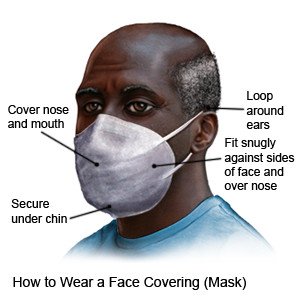
- Try to keep space between you and others when you are out of the house. Avoid crowds as much as possible. Wear a face covering when you must be around a large group and cannot keep space between you and others.
- Clean and disinfect high-touch surfaces and objects often. Use disinfecting wipes, or make a solution of 4 teaspoons of bleach in 1 quart (4 cups) of water.
- Stay home if you are sick or think you may have COVID-19. It is important to stay home if you are waiting for a testing appointment or for test results.
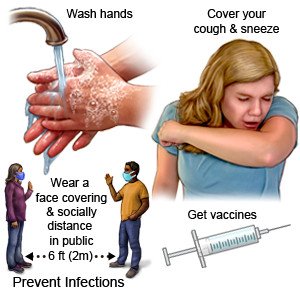 |
What you can do to have a healthy pregnancy:
- Keep all prenatal and postnatal appointments. You may be able to have certain prenatal appointments without having to go into the provider's office. Some providers offer phone, video, or other types of appointments. You may also be able to get prescriptions for a few months at a time. This will help lower the number of trips you need to make to the pharmacy for refills.
- Get recommended vaccines. Your healthcare provider can tell you if you need vaccines not listed below, and when to get them.
- Get an updated COVID-19 vaccine. A COVID-19 vaccine given while you are pregnant also helps protect your baby. The vaccines are updated throughout the year. Your provider can help you schedule all needed doses as updated vaccines become available.
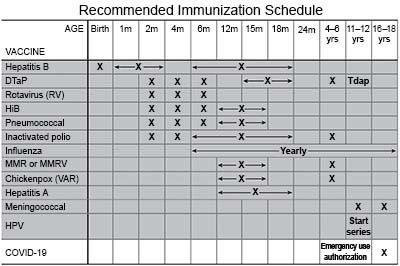
- Get the influenza (flu) vaccine. Try to get the vaccine as soon as recommended each year, usually starting in September or October.
- Get the Tdap vaccine. The Tdap vaccine protects you from tetanus, diphtheria, and pertussis. If possible, get the vaccine during weeks 27 to 36 of your pregnancy. You should get a dose of Tdap with each pregnancy.
- Get the respiratory syncytial virus (RSV) vaccine. The vaccine is given as a shot in 1 dose. Get the vaccine between 32 and 36 weeks of pregnancy, or at least 2 weeks before delivery. This helps protect your baby from RSV.
- Get an updated COVID-19 vaccine. A COVID-19 vaccine given while you are pregnant also helps protect your baby. The vaccines are updated throughout the year. Your provider can help you schedule all needed doses as updated vaccines become available.
- Take prenatal vitamins as directed. Your prenatal vitamins should contain folic acid. You need about 600 micrograms (mcg) of folic acid each day during pregnancy. Folic acid helps to form your baby's brain and spinal cord in early pregnancy.
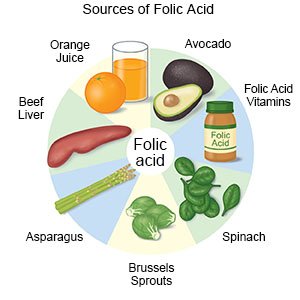
- Eat a variety of healthy foods. Healthy foods are important, even if you take a prenatal vitamin. Healthy foods contain nutrients that help keep your immune system strong. Examples of healthy foods include vegetables, fruits, whole-grain breads and cereals, lean meats and poultry, fish, low-fat dairy products, and cooked beans. Do not have raw, undercooked, or unpasteurized food or drinks. Unpasteurized foods are foods that have not gone through the heating process (pasteurization) that destroys bacteria. Your healthcare provider or a dietitian can help you create healthy meal plans.

- Talk to your healthcare provider about exercise. Moderate exercise can help keep your immune system strong. Your healthcare provider can help you plan an exercise program that is safe for you during pregnancy. You may need to exercise at home if you cannot exercise outdoors, such as walking in a park. If you want to do pregnancy yoga or other group activities, be safe. Stay at least 6 feet (2 meters) away from others in the class, and the instructor. Wash your hands before you leave the building. Follow the facility's instructions for preventing infections.
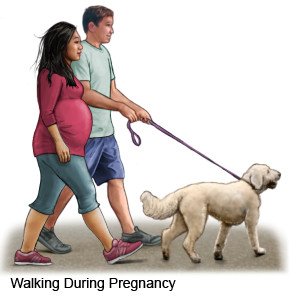
- Try to lower your stress. Talk to your healthcare providers about ways to manage stress. Set a sleep schedule to go to bed and wake up at the same times each day.
- Do not smoke cigarettes, drink alcohol, or use drugs. Nicotine and other chemicals in cigarettes and cigars can harm your baby and your health. Alcohol can increase your risk for a miscarriage. Your baby may also be born too small or have other health problems. Certain drugs can be passed to your baby before he or she is born. Some can be passed through breast milk. It is best to quit cigarettes, alcohol, and drugs before you become pregnant and not start again after your baby is born. Ask your healthcare provider for information if you currently use any of these and need help to quit.
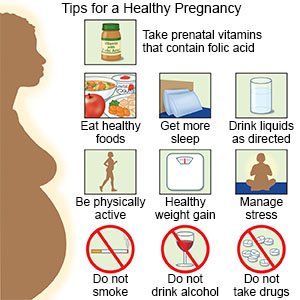 |
Protect your newborn during delivery and while you are in the hospital:
Some newborns have tested positive for the virus. The newborns may have been infected before, during, or after birth. The greatest risk is for a newborn to be in close contact with an infected person. Your baby may be tested for the virus soon after being born if you have COVID-19. He or she may be tested again before you leave the hospital. This depends on whether your baby has any signs or symptoms of COVID-19. You will be able to make choices for you and your baby during your hospital stay. Talk to healthcare providers about the following:
- Ask about temporary separation if you have COVID-19. Temporary separation means your newborn is moved to a different room from you. You will be able to make the decision if you want to do this. Separation will help lower your newborn's risk for being infected. You will still be able to give your newborn breast milk. You may need to pump the milk. Someone who does not have COVID-19 will then feed the pumped milk to your newborn. You may instead choose to have your baby brought to you when you want to breastfeed. Wash your hands and the skin around your nipples before you hold your baby. Wear a face covering while you breastfeed.
- Be careful if you have COVID-19 and do not choose temporary separation. Healthcare providers will keep your newborn at least 6 feet (2 meters) away from you as much as possible. Your newborn may be placed in an incubator. The incubator will help protect your newborn from infection. Always wash your hands and put on a face covering when you hold, touch, or have close contact with your newborn.
- Ask about visitors. Do not allow anyone who has known or suspected COVID-19 to visit. Even without signs or symptoms, the person can infect your newborn or others in the room. All visitors need to wash their hands before entering your room.
Protect your newborn at home:
- You can choose to continue temporary separation if you have COVID-19. You can do this if an adult who does not have COVID-19 can care for your newborn. Your healthcare provider can give you instructions on how to do this safely at home. Only have close contact with your newborn when needed. Remember to wash your hands and put on a clean face covering first. You may need to continue pumping your breast milk. A healthy adult can feed the pumped breast milk to your newborn. You may instead choose to have your baby brought to you when you want to breastfeed. Take precautions to keep your baby safe. Wash your hands and the skin around your nipples before you hold your baby. You will also need to wear a face covering while you breastfeed.
- Use face coverings safely. Everyone who has COVID-19 needs to wear a clean face covering while being within 6 feet (2 meters) of your newborn. This includes other children in your home who are 2 years or older.
- Keep all checkup appointments. You may be able to have some appointments by phone or video meeting. Other appointments will need to be in person, such as for vaccines. Vaccines are normally given to babies at certain ages. Your newborn's provider will give you a vaccine schedule. It is important for your newborn to get all recommended vaccines.
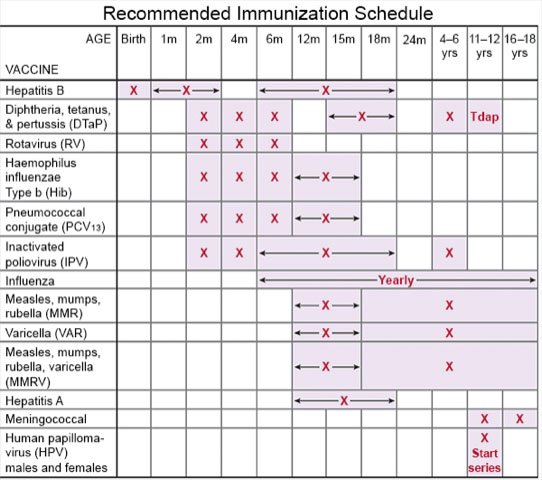
What you need to know about breastfeeding:
Breastfeeding for the first 6 months decreases your baby's risk for respiratory (lung) infections, allergies, asthma, and stomach problems. Breast milk also helps your baby develop a strong immune system. Breast milk is considered safe, even if you have COVID-19. Experts currently believe the virus that causes COVID-19 does not spread in breast milk. Do the following to help protect your baby:
- Wash your hands before every breastfeeding or pumping session. Even if you do not have COVID-19, you can transfer the virus from your hands to your baby or the pump. Use soap and water to wash your hands whenever possible. Use hand sanitizer that contains alcohol if soap and water are not available.
- If you have COVID-19, wear a face covering while you breastfeed or pump. This will help prevent you from passing the virus through droplets when you talk, cough, sneeze, or sing. You can also ask someone who is not infected to bottle feed your baby. Have the person wash his or her hands with soap and water before each feeding. The person can feed your newborn pumped breast milk or formula.
- Clean and sanitize your breast pump after each use. The virus can stay on surfaces such as a breast pump for hours to days. Follow the manufacturer's directions for cleaning and sanitizing the pump. It is important not to use it until it is clean and sanitized.
Follow up with your doctor or obstetrician as directed:
Write down your questions so you remember to ask them during your visits.
For more information:
- Centers for Disease Control and Prevention
1600 Clifton Road
Atlanta , GA 30333
Phone: 1- 800 - 232-4636
Web Address: http://www.cdc.gov
© Copyright Merative 2024 Information is for End User's use only and may not be sold, redistributed or otherwise used for commercial purposes.
The above information is an educational aid only. It is not intended as medical advice for individual conditions or treatments. Talk to your doctor, nurse or pharmacist before following any medical regimen to see if it is safe and effective for you.
Further information
Always consult your healthcare provider to ensure the information displayed on this page applies to your personal circumstances.
